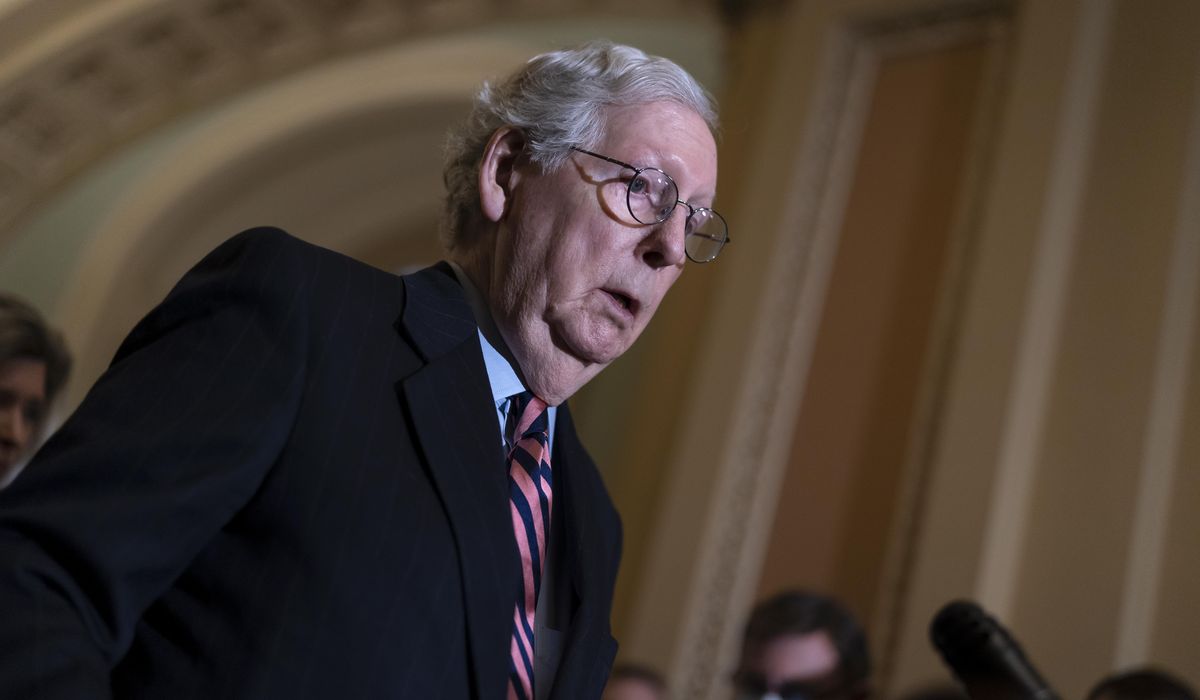
Senate Minority Leader Mitch McConnell warned on Thursday that any attempt by Democrats to blow up the legislative filibuster would result in “Armageddon for our institutions.”
Mr. McConnell, Kentucky Republican, said that Senate Democrats’ recent talk about nixing or altering the filibuster was nothing more than a distraction from the fact that President Biden’s mammoth social welfare bill had stalled.
“As cracks keep forming in the Democrats’ reckless taxing-and-spending spree,” said Mr. McConnell, “some of our colleagues seem to channel their frustration into even more radical attempts to attack our government institutions.”
The GOP leader warned it would set a terrible precedent for one party to destroy or alter institutional guardrails, like the filibuster or the size of the Supreme Court, just because their policy agenda had hit a wall.
“Entire generations of statesmen would have seen … these unhinged proposals as Armageddon for our institutions,” said Mr. McConnell.
Senate Democrats, frustrated with a lack of progress on Mr. Biden’s $1.75 trillion Build Back Better Act, have been talking about blowing up the filibuster rules again to force through a partisan overhaul of the country’s election laws.
“I think there’s a universal view in our caucus that we need to get something done,” said Senate Majority Leader Charles E. Schumer, New York Democrat. “There’s a strong belief in the Senate that we can restore the Senate and at the same time deal with voting rights, and that’s what we’re aiming to do.”
Mr. Schumer and other Democratic leaders say the recent success in creating a one-time fast track process for raising the debt limit by a simple majority has created an opportunity. They say that measure, which passed only because of the support of 10 Republican senators, has opened the door for a broader effort to suspend the filibuster one time to pass the elections bill.
“We in this chamber made a change in the Senate’s rules in order to push forward something that all of us think is important,” said Sen. Raphael Warnock, Georgia Democrat. “We set the stage to raise the nation’s debt ceiling, and yet as we cast that vote … this same chamber is allowing the ceiling of our democracy to crash in around us.”
Mr. Warnock and a cadre of Democratic senators are working to craft a plan to change the Senate’s long-standing filibuster rules, which require at least 60 votes to end debate on the legislation, to pass the election legislation.
The key to unlocking the rules change is Sen. Joe Manchin III, a moderate West Virginia Democrat. His support, alongside every other Democratic senator, would allow the majority to push through the change immediately with the tie-breaking vote of Vice President Kamala Harris.
Mr. Manchin has not specified if he is on board with the filibuster carveout, but has held talks with both Democrats and Republicans on what changes need to be made to make the Senate operate better.
“All of my discussions have been with bipartisan, Republicans and Democrats,” Mr. Manchin said. “The rules change should be done to be where we all have input in this rules change because we’re going to have to live with it.”
It is unclear exactly what the rule change would look like. Some lawmakers, like Mr. Warnock, are pushing for a simple one-time filibuster carveout to pass the Democrats’ election legislation.
Others want a more radical change to the Senate institution.
Along those lines, there is talk of changing the filibuster to require 41 “no” votes on ending debate rather than the 60 “yes” vote threshold.
Another possibility is to require senators to mount an old-fashioned “talking filibuster,” which would require lawmakers to speak continuously on the floor in objection to a bill. Senators currently are allowed to merely object to ending debate, forcing leadership to round up the votes necessary to overcome the 60-vote threshold.
Mr. McConnell warns that any effort to weaken the filibuster will launch a new era of partisan warfare.
“I understand my colleagues are frustrated,” Mr. McConnell said. “Lashing out at our democracy … and at the Senate itself is not going to solve anything.”








